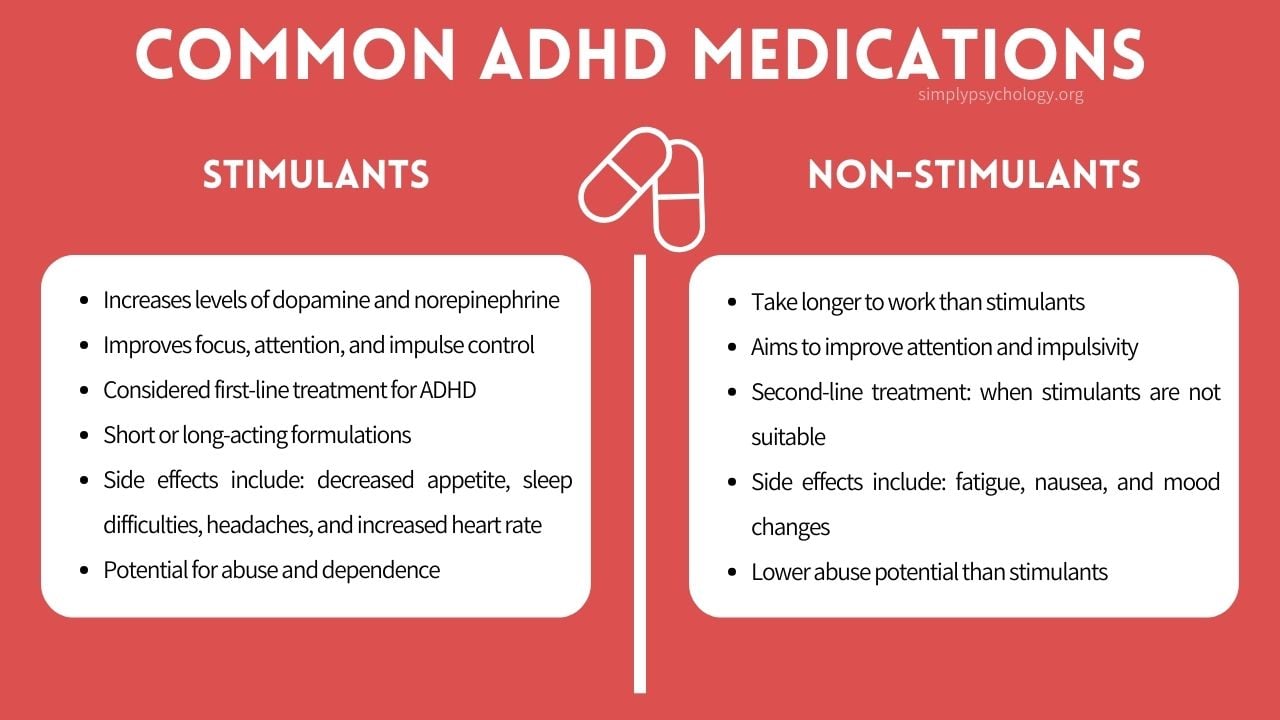Attention-deficit/hyperactivity disorder (ADHD) is a neurodevelopmental condition that affects both children and adults, causing difficulties with attention, impulse control, and hyperactivity.
While there are various approaches to managing ADHD, including behavioral therapies and lifestyle changes, medication is often a key component of treatment plans.
This article provides an overview of the types of medications used to treat ADHD, their effectiveness, potential side effects, and other important considerations.

Please note that this information is not intended as medical advice, and readers should always consult with a qualified healthcare professional for personalized guidance.
Types of ADHD Medications
There are two main categories of medications used to treat ADHD: stimulants and non-stimulants.
- Stimulants
Stimulant medications are the most commonly prescribed treatments for ADHD. They work by increasing the levels of certain neurotransmitters, such as dopamine and norepinephrine, in the brain. This helps improve focus, attention, and impulse control.
Examples of stimulant medications include:
- Methylphenidate (Ritalin, Concerta)
- Amphetamine (Adderall)
- Dextroamphetamine (Dexedrine)
- Lisdexamfetamine (Vyvanse)
Stimulants are available in both short-acting and long-acting formulations. Short-acting medications typically last for 4-6 hours, while long-acting formulations can provide symptom control for 8-12 hours.
2. Non-stimulants
Non-stimulant medications are an alternative for individuals who do not respond well to stimulants or experience intolerable side effects. These medications work differently than stimulants, but still aim to improve attention and reduce impulsivity.
Examples of non-stimulant ADHD medications include:
- Atomoxetine (Strattera)
- Guanfacine (Intuniv)
- Clonidine (Kapvay)
Non-stimulants may take longer to show therapeutic effects compared to stimulants, often requiring several weeks of consistent use before improvements are noticed.

Effectiveness of ADHD Medications
Numerous studies have demonstrated the efficacy of both stimulant and non-stimulant medications in managing ADHD symptoms.
A systematic review and meta-analysis found that the majority of studies showed a robust protective effect of ADHD medication treatment on mood disorders, suicidality, criminality, substance use disorders, accidents and injuries, traumatic brain injuries, motor vehicle crashes, and educational outcomes.
The meta-analyses also demonstrated a protective effect of medication treatment on academic outcomes, accidents and injuries, and mood disorders.
A meta-analysis of 34 randomized placebo-controlled trials found that stimulant medications had larger effect sizes than non-stimulants in reducing ADHD symptoms, improving functional impairments, and enhancing quality of life.
Effectiveness in Children and Adolescents
ADHD medication use has markedly increased in many countries, particularly among children aged 6-17.
A meta-analysis found that stimulant medication, specifically improved functional and life quality benefits in children and adolescents.
A cross-sectional evaluation suggests that ADHD medication was associated with fewer suicidal thoughts in children with substantial externalizing symptoms.
Studies have shown that stimulant medications can improve ADHD core symptoms and ADHD-related emotion dysregulation in children and adolescents in the short term.
It is important to note that medication is not a one-size-fits-all solution, and the effectiveness of a particular medication may vary from person to person. Working closely with a healthcare provider is crucial in finding the right medication and dosage for each individual.
Potential Side Effects
As with any medication, ADHD treatments can cause side effects. Common side effects of stimulant medications include (Smith et al. 2019):
- Decreased appetite
- Sleep difficulties
- Headaches
- Stomachaches
- Irritability
- Increased heart rate and blood pressure
Non-stimulant medications may cause side effects such as:
- Fatigue
- Nausea
- Dry mouth
- Constipation
- Dizziness
- Mood changes
Most side effects are mild and tend to subside over time. However, if side effects persist or become severe, it is essential to inform the prescribing healthcare provider, as adjustments to the medication or dosage may be necessary.
Questions to Ask an ADHD Specialist
When considering ADHD medication, it’s essential to consult with an ADHD specialist or experienced psychiatrist. Here are some questions to ask during your appointment:
- What are the potential benefits and risks of ADHD medication for my specific situation?
- How will you determine the most appropriate medication and dosage?
- What non-medication treatments do you recommend in conjunction with or instead of medication?
- How long does it typically take to see improvements in symptoms with medication?
- What side effects should I watch out for, and how can they be managed?
- How often will you monitor progress and adjust treatment if needed?
- What are the long-term implications of taking ADHD medication?
- Are there any lifestyle changes or behavioral strategies that can enhance the effectiveness of medication?
Is Medication Right for Me?
Deciding whether to take ADHD medication is a personal choice that should be made in collaboration with your healthcare provider. Consider the following factors when making your decision:
- Severity of symptoms: If your ADHD symptoms significantly impact your daily functioning, relationships, or work/school performance, medication may be a helpful treatment option.
- Non-medication treatments: Have you tried other interventions, such as behavioral therapy, lifestyle changes, or accommodations at school or work? If these approaches haven’t provided sufficient relief, medication may be the next step.
- Personal preferences: Some people may prefer to manage their symptoms without medication, while others feel that the benefits outweigh any potential side effects. Consider your values and goals when making your decision.
- Family history: If close family members have had positive experiences with ADHD medication, this may influence your choice.
- Comorbid conditions: If you have other mental health or physical conditions, your healthcare provider can help you determine if ADHD medication is safe and appropriate for your specific situation.
Remember, medication is not the only treatment option for ADHD, and it’s not a magic solution. It’s essential to work closely with your healthcare provider to find the most effective and well-tolerated treatment plan for your individual needs, which may include a combination of medication, therapy, and lifestyle modifications.
Considerations and Alternative Treatments
When exploring treatment options for ADHD, it’s essential to consider a holistic approach that addresses not only the core symptoms but also the overall well-being and quality of life of the individual.
While medication can be highly effective, it’s not the only path to managing ADHD. Psychotherapies such as cognitive behavioral therapy (CBT) should also be considered.
Likewise, self-help strategies can be powerful tools in conjunction with or as an alternative to medication. These include:
- Establishing routines and organization systems: Using planners, calendars, and to-do lists can help individuals with ADHD stay on track and minimize forgetfulness.
- Managing time effectively: Breaking tasks into smaller, manageable steps and using techniques like the Pomodoro method can improve focus and productivity.
- Creating a supportive environment: Minimizing distractions, decluttering workspaces, and seeking support from friends and family can foster a more conducive atmosphere for managing ADHD symptoms.
- Implementing healthy lifestyle habits: Regular exercise, balanced nutrition, and adequate sleep can significantly impact overall functioning and symptom management.
- Practicing mindfulness and relaxation techniques: Mindfulness, deep breathing, and meditation can help reduce impulsivity, improve emotional regulation, and alleviate stress and anxiety often associated with ADHD.
While self-help strategies can be highly beneficial, it’s important to recognize that they may not be sufficient for everyone. If symptoms persist or significantly impact daily functioning, it’s crucial to consult with a qualified healthcare professional to explore additional treatment options, such as therapy, medication, or a combination of both.
Conclusion
Medication can be a highly effective tool in managing ADHD symptoms, helping individuals improve focus, impulse control, and overall functioning.
Stimulant medications are the most commonly prescribed treatments, but non-stimulant options are available for those who do not respond well to stimulants or experience intolerable side effects.
The effectiveness of ADHD medications has been well-established in both children and adolescents, with the majority of studies showing protective effects on various functional outcomes.
However, it is crucial to work closely with a healthcare provider to find the most appropriate medication and dosage, and to monitor for potential side effects.
Medication should be part of a comprehensive treatment plan that may include behavioral therapies, educational support, and lifestyle modifications.
Remember, this article is for informational purposes only and should not be considered medical advice. Always consult with a qualified healthcare professional for personalized guidance on managing ADHD.
References
Boland, H., DiSalvo, M., Fried, R., Woodworth, K. Y., Wilens, T., Faraone, S. V., & Biederman, J. (2020). A literature review and meta-analysis on the effects of ADHD medications on functional outcomes. Journal of Psychiatric Research, 123, 21-30. https://doi.org/10.1016/j.jpsychires.2020.01.006
Cortese, S., Adamo, N., Del Giovane, C., Mohr-Jensen, C., Hayes, A. J., Carucci, S., … & Cipriani, A. (2018). Comparative efficacy and tolerability of medications for attention-deficit hyperactivity disorder in children, adolescents, and adults: a systematic review and network meta-analysis. The Lancet Psychiatry, 5(9), 727-738. https://doi.org/10.1016/S2215-0366(18)30269-4
Hennissen, L., Bakker, M. J., Banaschewski, T., Carucci, S., Coghill, D., Danckaerts, M., … & ADDUCE consortium. (2017). Cardiovascular effects of stimulant and non-stimulant medication for children and adolescents with ADHD: a systematic review and meta-analysis of trials of methylphenidate, amphetamines and atomoxetine. CNS drugs, 31, 199-215. https://doi.org/10.1007/s40263-017-0410-7
Sayal, K., Prasad, V., Daley, D., Ford, T., & Coghill, D. (2018). ADHD in children and young people: prevalence, care pathways, and service provision. The Lancet Psychiatry, 5(2), 175-186. https://doi.org/10.1016/S2215-0366(17)30167-0
Shoval, G., Visoki, E., Moore, T. M., DiDomenico, G. E., Argabright, S. T., Huffnagle, N. J., … & Barzilay, R. (2021). Evaluation of attention-deficit/hyperactivity disorder medications, externalizing symptoms, and suicidality in children. JAMA network open, 4(6), e2111342-e2111342. doi:10.1001/jamanetworkopen.2021.11342
Smith, B. H., Reid, E. K., Sajovec, P., & Namerow, L. (2019). Pharmacological treatment of attention-deficit/hyperactivity disorder. In S. M. Evans & K. M. Carpenter (Eds.), APA handbook of psychopharmacology (pp. 347–371). American Psychological Association. https://doi.org/10.1037/0000133-016
Vuori, M., Koski-Pirilä, A., Martikainen, J. E., & Saastamoinen, L. (2020). Gender- and age-stratified analyses of ADHD medication use in children and adolescents in Finland using population-based longitudinal data, 2008-2018. Scandinavian Journal of Public Health, 48(3), 303-307. https://doi.org/10.1177/1403494820901426

